08/11/21
K-State Current - August 11, 2021
K-State Current is a weekly news update for the Kansas Board of Regents to apprise the Regents on a few of the many successes and achievements made by K-State faculty, staff and students.
K-State News
Erickson named interim chief operations officer
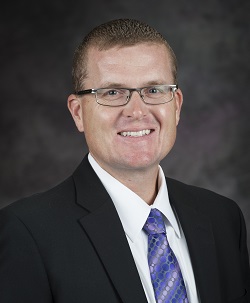 Ethan Erickson, Kansas State University chief financial officer, will also serve as interim vice president and chief operating officer. President Richard Myers announced the appointment, which will become effective Sept. 5 and is in conjunction with the retirement of Cindy Bontrager, vice president and chief operations officer.
Ethan Erickson, Kansas State University chief financial officer, will also serve as interim vice president and chief operating officer. President Richard Myers announced the appointment, which will become effective Sept. 5 and is in conjunction with the retirement of Cindy Bontrager, vice president and chief operations officer.
In addition to his current responsibilities as chief financial officer, Erickson will supervise all facilities planning and maintenance, risk and compliance, police and public safety, environmental health and safety, parking and the administrative support center.
"I am grateful for Ethan's willingness to serve the university in this way. He will provide the proven and immediate leadership we need during this transitional period," Myers said.
Erickson will begin working immediately with Bontrager to address several urgent transition needs, including hiring for key vacant positions and analysis work required for the Kansas Board of Regents’ new deferred maintenance plan. He will serve in this interim role until a decision is made on a search for the permanent role.
Named the university's chief financial officer in 2019, Erickson previously served as assistant vice president for budget planning for five years. He came to K-State from the Kansas Department of Education where he served as director of fiscal services and operations and managed funds of approximately $3.8 billion. He also held budget positions with the Kansas Department of Transportation and the Kansas Division of the Budget.
Erickson has a Master of Business Administration and a Bachelor of Science in business administration, both from Kansas State University.
K-State Faculty Highlights
Beach Museum of Art director serves as mentor in NSF project
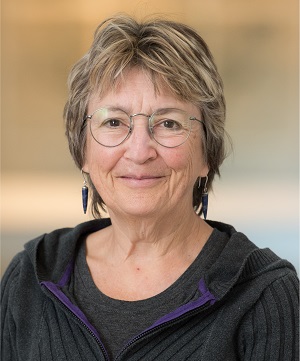 Linda Duke, director of the Kansas State University Marianna Kistler Beach Museum of Art, was co-author of a paper presented by three Texas Tech University faculty members at the 128th Annual Conference of the American Society for Engineering Education. The conference was held virtually this year July 26-29. Read a description of the session.
Linda Duke, director of the Kansas State University Marianna Kistler Beach Museum of Art, was co-author of a paper presented by three Texas Tech University faculty members at the 128th Annual Conference of the American Society for Engineering Education. The conference was held virtually this year July 26-29. Read a description of the session.
Since 2017, Duke has served as a consultant on a National Science Foundation-sponsored project at Texas Tech University to create an experimental graduate curriculum for the environmental engineering program. The aim is to better support development of reflective decision-making in engineers who will face complex ecological and societal issues.
The project, led by a cross-disciplinary faculty team, has tapped the arts, including literature and visual arts, and used writing assignments and discussions. Duke’s role was to introduce faculty and graduate students to Visual Thinking Strategies, or VTS, and mentor their use of the protocols. VTS is a facilitated discussion technique that supports a group in examining and discussing a complex or ambiguous image, usually a work of art.
Duke made annual trips to the Lubbock campus for intensive workshops held at the Museum of Texas Tech University. She was invited because of her work over the past 20 years to apply the skill-building capacity of VTS to adult learning broadly, and particularly to the needs of scientists and others who deal with dense, complex information. VTS has been used to enhance the observation, critical thinking and communication skills of undergraduate and graduate students, as well as scientists, mathematicians, engineers and medical professionals.
Duke and other Beach Museum of Art staffers regularly collaborate with K-State researchers on projects that involve visual tools or visual knowledge.
K-State engineering faculty earn Concept of the Year award
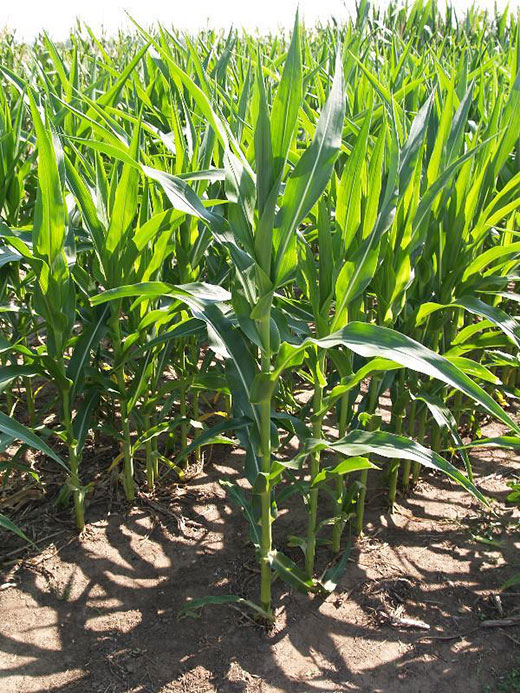 K-State agricultural engineers Ajay Sharda and Dan Flippo are testing an idea to automate processes that measure seed depth, spacing and geo-location in corn and soybean fields.
K-State agricultural engineers Ajay Sharda and Dan Flippo are testing an idea to automate processes that measure seed depth, spacing and geo-location in corn and soybean fields.
A Kansas State University team of researchers in agricultural engineering has been recognized for an idea that will use robotic machines to collect data that can help farmers make better decisions when planting crops.
The American Society of Agricultural and Biological Engineers awarded its annual Rain Bird Engineering Concept of the Year award to K-State associate professors Ajay Sharda and Dan Flippo, who have led the project from development to filing a patent and integrating their idea into on-farm machinery.
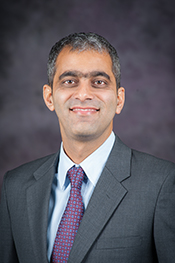 The award is sponsored by Rain Bird International.
The award is sponsored by Rain Bird International.
“In farming, data is a most precious commodity,” said Sharda, noting that current methods to collect research data on the effectiveness of machines to plant seeds relies heavily on manpower.
“Every year, our graduate students spend weeks in the field to measure seed depth by manually digging around emerged seeds to capture data on plant spacing,” Sharda said. “This is a difficult task to complete during the summer and difficult to capture on multiple sites due to the lack of sufficient manpower. So, it puts limitations on the amount of data that can be captured.”
The K-State researchers have proposed automating this process by developing a prototype for seed location and sensing (SLS), which they tested in field conditions. The system they are developing incorporates a color camera, laser line scanner and a global navigation satellite systems (GNSS) unit to collect real-time data.
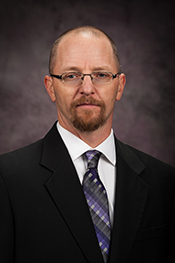 So far, their research has gone well, according to Sharda.
So far, their research has gone well, according to Sharda.
“The system provided the performance we desired and very accurate data during preliminary tests,” he said. “Our SLS system thus became the first product in industry and academia to provide real-time seeding depth, spacing and geo-location information.”
Their work is still early and because the patent is not yet final, Sharda can’t get too far into the details. But the researchers have already built a couple improvements to their original work, and are expecting the next version in time for the 2022 planting season.
“One of the major equipment manufacturers has leased this technology for future development…and has integrated it with a 12 row planter to help us verify the technology in field conditions,” Sharda said.
K-State’s work is being conducted in its recently formed laboratory -- called Fusing Automation and Robotics in Ag Machine Systems (FARMS) – that is located in the College of Engineering. Sharda credited doctoral student Sylvester Badua, “who did the majority of the work to develop the SLS system.”
ASABE, an educational and scientific organization founded in 1907, recognizes one project with its Concept of the Year award to honor unique contributions to developing or advancing a new engineering concept. The K-State team was named this year’s winner during ASABE’s summer meeting.
K-State Student News
Medical laboratory sciences student receives nationally competitive Watson Scholarship
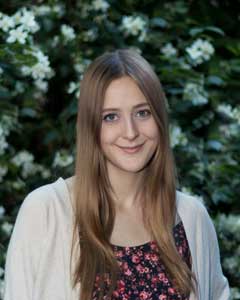 Adara Warner, medical laboratory science student in the College of Arts and Sciences at Kansas State University, was selected as a recipient of the Watson Scholarship, a competitive Alpha Mu Tau Fraternity undergraduate award.
Adara Warner, medical laboratory science student in the College of Arts and Sciences at Kansas State University, was selected as a recipient of the Watson Scholarship, a competitive Alpha Mu Tau Fraternity undergraduate award.
Only 18 students were selected from a nationwide pool of medical laboratory science degree program applicants. The mission of Alpha Mu Tau is to recognize those who have made outstanding professional contributions to the field of clinical laboratory science and to provide scholarships in support of educational endeavors.
Warner, Belleville, is attending North Kansas City Hospital in Kansas City and will complete 46 weeks of clinical training. Upon completion, she is eligible to take the national exam to become a certified medical laboratory scientist.
"Warner is a hardworking and highly motivated student who is excelling in our program," said Marisa James, the medical laboratory science degree director at North Kansas City Hospital.
Warner was an exemplary student in the Division of Biology. She was recognized with several honors including the Most Promising Student Award, which is based on academic performance, activities and achievements. From 2019-2021, Warner conducted research in the genetics laboratory of Kathrin Schrick, where she studied specific proteins that regulate gene expression. Her research project was funded through a K-INBRE Scholarship and an Undergraduate Research Award from the Johnson Cancer Research Center. She received an Outstanding Poster Award at the annual K-INBRE Conference in Wichita in 2020, and last spring she participated in the K-State Undergraduate Research Showcase.
Upon graduation, Warner's goal is to become a supervisor of a clinical laboratory. She is particularly interested in microbiology, pathology and the microscopic world, which has a substantial impact on our lives and the environment. Long term, she is aiming for medical school and believes that a career in medical laboratory science, as well as her research experience, will provide an excellent foundation.
Two agronomy graduate students awarded research grants in sustainable agriculture
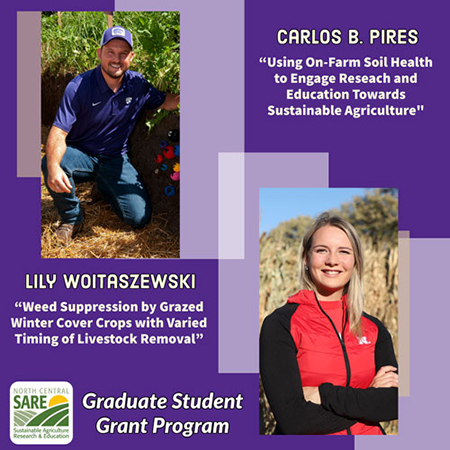 Two graduate students in the agronomy department recently received research grants from the North Central Region Sustainable Agriculture Research and Education Program.
Two graduate students in the agronomy department recently received research grants from the North Central Region Sustainable Agriculture Research and Education Program.
Of the 57 proposals submitted by graduate students from across the north-central region, 24 were selected for funding. The funding period for the grants will begin this fall and run for two years.
Doctoral student Carlos Bonini Pires received approval for his proposal “Using On-Farm Soil Health to Engage Research and Education Toward Sustainable Agriculture." For this project, Kansas State University, Bayer Crop Science, USDA-NRCS, Guetterman Brothers Family Farms and The SAVE Farm will form a team to provide integrated research, extension and education efforts to farmers and future agriculture players on the understanding of soil health and sustainable agricultural practices.
This project builds upon the Kansas Soil Health Partnership and will extend the on-farm soil health research conducted at Guetterman Brothers Family Farms in Bucyrus since 2018 for seven years. Besides research, this project will have a strong extension and outreach component. The involvement of farmers via field days and educational approaches such as cover crop gardens and bilingual soil health videos will substantially affect the adoption of sustainable practices, increase soil organic carbon, soil biodiversity, water infiltration and reduce soil erosion.
Piris is originally from southern Brazil and graduated from the Federal University of Santa Maria–Brazil, with a Bachelor of Science in agronomy. He is currently the president of the Brazilian Student Association and vice president of the Agronomy Graduate Student Association. He is working on his doctorate under the direction of Chuck Rice.
Lily Woitaszewski, a master’s student, will be working on her project, “Weed Suppression by Grazed Winter Cover Crops with Varied Timing of Livestock Removal." As resistant populations of weed species in Kansas continue to rise, there is a need to implement integrated weed management practices. Cereal rye cover crops produce large amounts of biomass and therefore suppress weed growth. Cattle producers also utilize cereal rye as forage to balance economic costs.
This project will help uncover the optimum grazing period needed to achieve the highest level of weed suppression. Educated management decisions early in the growing season will offer economic gain by balancing weed management costs later in the growing season with the value of beef production realized in the late winter and early spring. The recommendations from this experiment will have both direct and indirect effects that will reduce weed populations, herbicide resistance and overall herbicide applications. Producer profitability will increase as well as stewardship of the environment through the use of integrated weed management strategies.
Woitaszewski was raised on a cow-calf and row crop farm in Nebraska. She completed her undergraduate degree in agronomy with a minor in agricultural economics at the University of Nebraska, Lincoln. She is currently working on her master’s degree in weed science under the supervision of Sarah Lancaster.